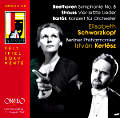ORFEO International – Reviews
Important Releases Briefly Introduced
September 2013
Salzburger Festspieldokumente 2013
The requirements of running a festival must at times seem paradoxical: exceptional artists are gladly engaged time and again, but at the same time the uniqueness of their achievements is devalued by this repetition. One of the personalities who for years helped to mould the image of the Salzburg Festival was undoubtedly Wilhelm Furtwängler. 
C 880 132 IBut the fact that he conducted Verdi’s Otello in the summer of 1951, on the 50th anniversary of the composer’s death, was one of those coups that give a festival its particular appeal. At the helm of the Vienna Philharmonic, Furtwängler succeeded on the opening night in turning the audience’s surprise into enthusiasm. The thoroughly symphonic conception of this late opera score of Verdi’s was brilliantly transformed by Furtwängler into a kind of “psychological drama” of its title hero, sung by Ramón Vinay at the height of his vocal powers – a tireless heldentenor with a rich variety of shadings in his voice. As the scheming Iago, Paul Schöffler’s extraordinarily sophisticated baritone was his equal, just as Dragica Martini, at the beginning of her international career, proved a perfect Desdemona, possessed as she was of a most graceful soprano voice. Great pains had been taken to cast the production, right down to the less extensive roles (for example, Anton Dermota sang Cassio and Josef Greindl was Lodovico), and together with the chorus of the Vienna State Opera, which had been excellently prepared, the result was a performance of Otello that is regarded as exemplary to this day and is now available on CD, its sound fully restored.
István Kertész’s early death from a swimming accident in 1973, aged just 44, meant that he performed very little in Salzburg. 
C 881 132 BIn the previous decade he had quickly established himself as a first-class conductor of the younger generation with a large repertoire ranging from the Viennese classics to the Modern. In Salzburg in 1962 he confirmed his reputation, conducting the Berlin Philharmonic in a programme that reached from Ludwig van Beethoven’s 8th Symphony via Richard Strauss’s Four last songs to Béla Bartók’s Concerto for Orchestra, all of which made evident Kertész’s stylistic flexibility – everything was surging with energy and played with great lucidity. This concert (and thus the present recording of it) was further enriched by the presence of Elisabeth Schwarzkopf – a Strauss interpreter without peer to the present day.
Shura Cherkassky was characterized by a degree of “unpredictability” not least in matters of programme planning. 
C 882 132 BThis pianist was several times a guest at the Salzburg Festival, but it was perhaps precisely his ability to display his virtuosity in music of the most varied constellations and epochs that meant he remained less fixed in the collective memory of the Festival audiences than did many a prominent colleague. But if one hears the recording of his solo concert from 1961, one is not surprised that the brilliance of Cherkassky’s piano playing was at the time appreciated as much as the sense of balance that he achieved in his interpretations. Thus in the concert documented on this CD he was able to follow a well-proportioned interpretation of Mozart’s Sonata K 330 with Schumann’s high-Romantic C-major Fantasy and then contrasted a powerful performance of Mussorgsky’s Pictures at an Exhibition with Barber’s trenchant Excursions. With Chopin’s Nocturne op. 55/1 and the Andante spianato et Grande Polonaise brillante, Cherkassky finally arrived at the composer with whom his name is perhaps most associated today.
The Soviet pianist Emil Gilels also had a huge repertoire. He began his international career at a relatively late date and impressed one in particular with the carefully considered sense of unity and interconnectedness of his concert programmes. 
C 883 132 BThis was also the case in Gilels’ penultimate concert at the Salzburg Festival, in the summer of 1976. Beethoven’s middle-period sonatas op. 26 and op. 31/1 can rarely have been heard in such a rounded, masterful interpretation, so devoid of any superficial effects as is here the case in Gilels’ performance (even in the variation movement of op. 26). After the interval he moved on to Schumann (with the Toccata op. 7 and the Arabeske op. 18) and to Brahms (the Four Ballads op. 10), though this was far more than a mere musico-historical progression, for Gilels here entered into dynamic realms of extreme subtlety and tenderness alongside thundering eruptions, all of which gave expression to the manner in which these post-Beethovenian composers explored to the full the formal possibilities inherent in the music.
The privilege of performing Schubert’s Winterreise at the Salzburg Summer Festival is reserved for only remarkable artistic personalities. In 1978, Dietrich Fischer-Dieskau and Maurizio Pollini came together for the first and only time as a lied duo in order to perform this great cycle. 
C 884 131 BWe must be all the more grateful that the Austrian Radio recorded their encounter. The fact that this interpretation remained unrepeated is perhaps only explicable in that something so unique should perhaps remain thus. Fischer-Dieskau’s balance of words and music remains unsurpassed – here he also succeeded in creating a mighty, continuous arc of tension from the first to the last of the 24 songs. With his accents and details in the tempi and dynamics – at times quite startling – Pollini proved that the piano part in Schubert’s songs is far more than a mere “accompaniment”. It is not least Festival documents such as this that prove how great musicians often bring forth extraordinary things on unusual terrain.
top |